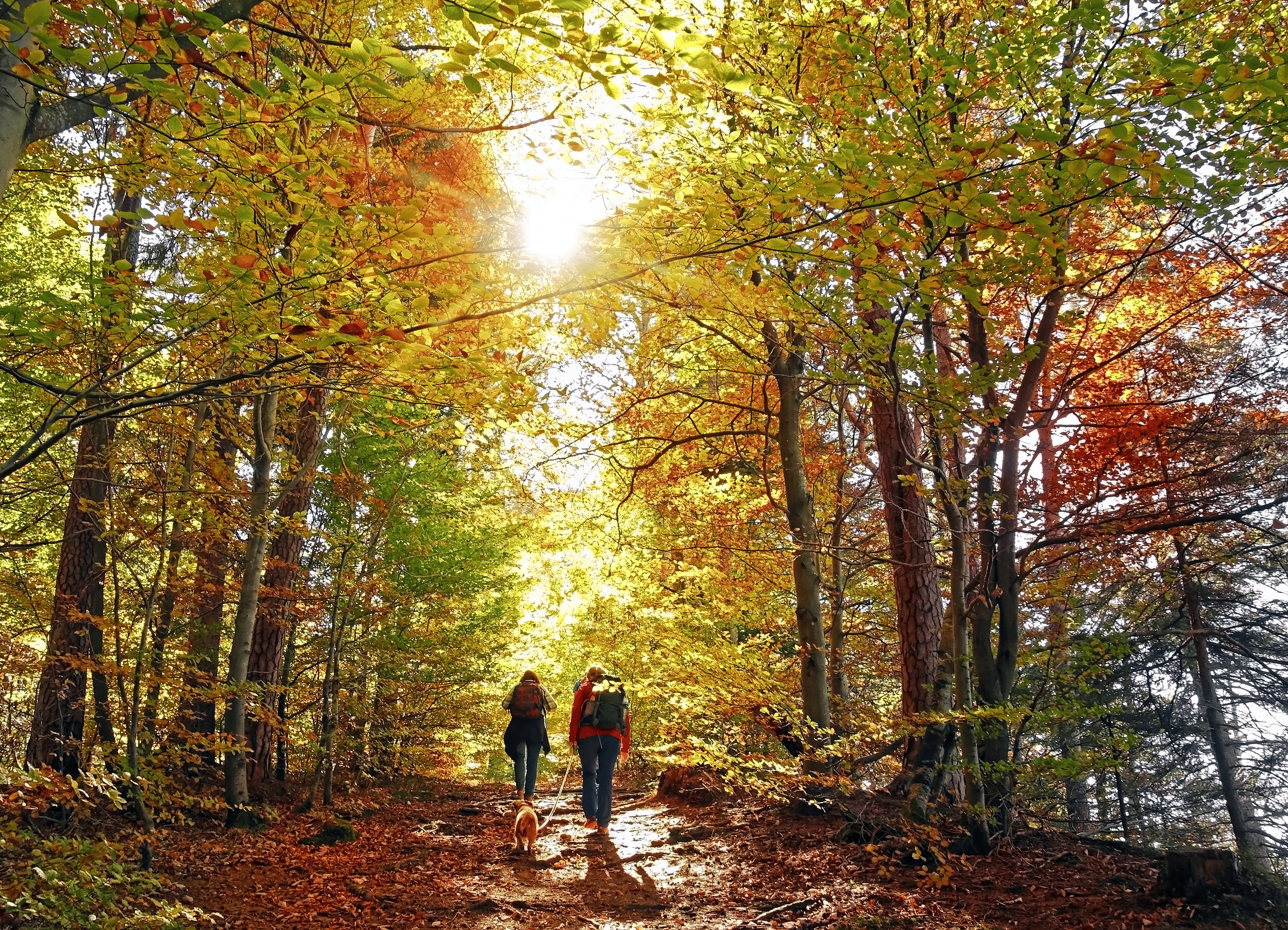A woman hikes amongst green forest trees, letting herself get “lost” in nature, a simple, science-backed way to boost mental health, reduce stress, increase focus, and feel fully alive in the great outdoors.
The phrase “Take a hike” has traditionally carried a negative connotation, as in “Get lost” or “Go away.” But here on National Take a Hike Day, I’m officially reclaiming the phrase!
A “hike” is defined as a long, vigorous walk, typically on trails in a natural environment like the mountains, forest, desert, or countryside, though urban hiking exists, too. Hiking is usually more strenuous than a casual walk and often involves navigating uneven terrain, elevation changes, and sometimes carrying a backpack with water or supplies.
So from now on “Take a hike” is going to mean: go for an actual nature hike and intentionally “get lost.”
Get lost in the trees, rocks, wood chips, sand, or whatever scenery surrounds you.
Get lost in the birds singing and the wind whistling overhead.
Get lost in the scent of flowers, sage, or pine.
Get lost in your feet hitting the ground, the wind in your hair, and the sun (or rain, or snow) kissing your face.
Get lost in conversation with your hiking partner.
Get lost in the moment.
A couple and their dog wander through a forest glowing with fall colors, letting themselves “get lost” in the shifting seasons. Even a simple hike can quiet the mind, ease stress, and help us feel like ourselves again.
Get lost so you can be found.
I know, I know, that sounds cheesy as heck. But honestly? There is truth in cheese.
Our brains and bodies need nature and the quiet that comes from spending time outdoors. In a modern society filled with noise, light pollution, constant digital stimulation, and fast-moving images on every screen, we rarely get true rest or rejuvenation. So, we end up being bogged down by stress, anxiety, overwhelm, disconnection, difficulty focusing, and depression.
Our paleolithic brains and bodies are hurting inside our medieval institutions and this god-like technology, and most of us aren’t listening to the discomfort. We’re not heeding the warnings.
When we spend too much time in manufactured environments—full of steel, asphalt, concrete, and artificial light—we’re forced to use more directed attention than our systems can handle. It fatigues and even damages our brains.
But when we step into nature, our brains and bodies finally have permission to relax. Being outdoors begins to heal that damage. And when we add movement, like the gentle, (Well, depending on the trail…) rhythmic exercise of hiking, we feel even better.
The Physical Benefits of Hiking
Hiking is one of the most accessible and research-backed forms of nature-based exercise. It strengthens the heart and lungs, improves circulation, lowers blood pressure, and reduces the risk of heart disease, stroke, and type 2 diabetes.
A lone hiker makes their way up a mountain trail, soaking in the views. Outdoor adventure is one of the most fun, effective, science-backed ways to boost your physical and mental health and well-being.
Because hiking is a weight-bearing activity that often includes uneven terrain, it also:
Builds strength in the core, glutes, hamstrings, and quadriceps
Improves balance and coordination
Boosts bone density, helping prevent osteoporosis and reducing the risk of falls
Burns calories and supports sustainable weight management
The Mental and Emotional Benefits of Hiking
Hiking in nature is also a powerful mental health tool. Regular time outdoors:
Reduces stress, anxiety, and symptoms of depression
Triggers endorphins that boost mood and reduce pain
Enhances creativity and problem-solving
Improves memory and cognitive function
Helps regulate sleep cycles through natural light exposure
Promotes mindfulness, presence, and emotional awareness
Deepens our sense of connection to ourselves, others, and the natural world
Even short hikes or nature walks can help restore our attention, stabilize emotions, and provide meaningful relief from the overwhelm of modern life.
Don’t Have Wilderness Nearby? You Can Still Hike.
Casual crew of urban hikers showing that you don’t need mountains or wilderness to “get lost” in nature. Even a simple urban hike in LA delivers some health and wellness.
You don’t need a mountain range or national park to experience the benefits of hiking. Urban hiking, which is walking through city parks, greenbelts, or any environment with trees and open sky, still supports physical, mental, and emotional well-being.
And you don’t need fancy gear to get started. A pair of shoes with decent tread and a water bottle will do just fine. If you eventually feel called to longer hikes, backpacking trips, or, who knows, Everest, then yes, proper equipment and training matter. But for today, the point is simple:
Get your body outside and moving long enough to feel the good-good.
So, head out, breathe deeply, slow down, look around, and intentionally get lost on this National Take a Hike Day.
Your body, brain, and whole being (as well as those around you) will thank you.
Written by Amanda Stemen, MS, LCSW




